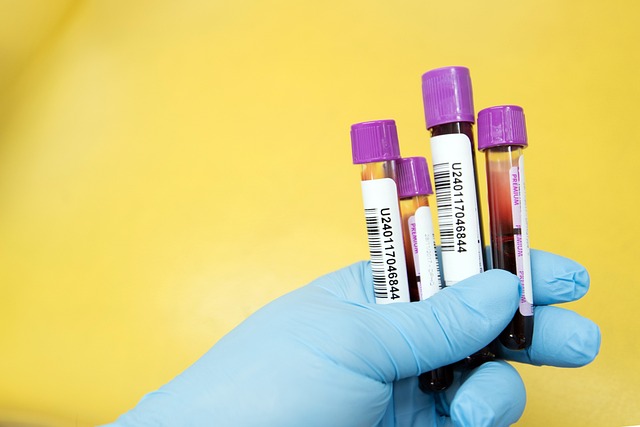Iron deficiency anemia, a common blood disorder, can be detected early in the UK through routine kidney blood tests measuring ferritin, hemoglobin (Hb), and hematocrit. These tests are crucial for identifying anemia before symptoms like fatigue, breathlessness, and dizziness worsen. Healthcare professionals analyze Hb and ferritin levels to diagnose anemia, which is treated by raising iron levels through dietary changes, supplements, or intramuscular injections, with close monitoring for successful management. The UK Kidney Blood Test is a vital tool for detecting and managing iron deficiency anemia.
Iron deficiency anemia is a common yet serious condition affecting many individuals. It occurs when your body doesn’t have enough healthy red blood cells, leading to fatigue and other health issues. This article explores the impact of iron deficiency anemia and introduces the UK Kidney Blood Test as a key diagnostic tool. We’ll guide you through interpreting results and available treatment options, empowering you with knowledge on managing this condition effectively, starting with this essential check-up: the UK Kidney Blood Test.
- Understanding Iron Deficiency Anemia and Its Impact
- UK Kidney Blood Test: The Diagnostic Tool
- Interpreting Results and Treatment Options
Understanding Iron Deficiency Anemia and Its Impact
Iron deficiency anemia is a common blood disorder where the body lacks enough healthy red blood cells, leading to reduced oxygen delivery to various parts of the body. This condition arises when there’s an insufficient amount of iron in the diet or due to blood loss. Iron plays a vital role in producing hemoglobin, the protein responsible for carrying oxygen in red blood cells. When iron levels dip below normal, it can have significant health implications.
In the UK, kidney blood tests often form part of routine check-ups and can be instrumental in detecting iron deficiency anemia early. These tests measure various indicators, including ferritin levels, which store and provide iron for the body’s use. Low ferritin levels may suggest iron deficiency. Other markers like hemoglobin and hematocrit levels are also assessed to confirm the diagnosis. Prompt identification of iron deficiency anemia is crucial as it can lead to fatigue, shortness of breath, dizziness, and even heart complications if left untreated.
UK Kidney Blood Test: The Diagnostic Tool
In the UK, the kidney blood test has established itself as a valuable diagnostic tool for identifying iron deficiency anemia. This comprehensive assessment goes beyond mere iron levels, scrutinizing various indicators within the bloodstream to pinpoint the presence and severity of anemia. By analyzing parameters such as hemoglobin concentration, red blood cell count, and certain hormones, healthcare professionals can gain profound insights into a patient’s overall health, particularly focusing on their nutritional status and bone marrow function.
The UK kidney blood test offers several advantages, enabling early detection and facilitating tailored treatment plans. This is particularly crucial for iron deficiency anemia, as it can be insidious, often presenting with subtle symptoms. With this test, medical experts can make informed decisions, ensuring patients receive the most effective interventions to manage and prevent further complications related to iron deficiency.
Interpreting Results and Treatment Options
Interpretation of results: After your blood test, a qualified healthcare professional will analyse the results to determine if you have iron deficiency anaemia. The UK Kidney Blood Test typically looks at two key markers: haemoglobin (Hb) levels and ferritin levels. Haemoglobin is a protein in red blood cells that carries oxygen around the body; low Hb levels can indicate anaemia. Ferritin is a protein that stores iron in your body; low ferritin levels suggest that there’s not enough iron available, which could be a sign of deficiency. If your results show low Hb and/or ferritin levels, it’s likely you have iron deficiency anaemia.
Treatment options: Once diagnosed, several treatment approaches can help manage iron deficiency anaemia. The primary goal is to increase iron levels in the body. This can be achieved through dietary changes, such as eating iron-rich foods like leafy green vegetables and lean meats. Additionally, over-the-counter or prescription iron supplements are often recommended to boost iron stores. In more severe cases, intramuscular injections of iron may be administered by a healthcare professional. Close monitoring during treatment is crucial to ensure that iron levels return to normal and symptoms improve.
Iron deficiency anemia, a common yet often overlooked health issue, can be effectively diagnosed using simple blood tests, such as the UK Kidney Blood Test. By understanding the impact of iron deficiency and interpreting test results accurately, healthcare professionals can swiftly identify and treat this condition, leading to improved overall health and well-being. The UK Kidney Blood Test serves as a valuable tool in navigating the diagnostic process, ensuring timely intervention and positive outcomes for those affected.
